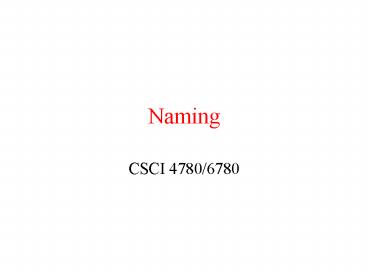Naming - PowerPoint PPT Presentation
Title:
Naming
Description:
Naming CSCI 4780/6780 Name Space Implementation Naming service A service that lets users to add/delete and lookup names In large distributed systems naming ... – PowerPoint PPT presentation
Number of Views:56
Avg rating:3.0/5.0
Title: Naming
1
Naming
- CSCI 4780/6780
2
Name Space Implementation
- Naming service A service that lets users to
add/delete and lookup names - In large distributed systems naming service has
to be distributed - For convenience namespace is partitioned into
logical layers - Global layer Highest level nodes (root and
first level children) - Administration layer Directory nodes managed by
single organization (Ex Departmental nodes in
UGA) - Managerial layer Nodes of local network, shared
files, etc.
3
Name Space Distribution
- An example partitioning of the DNS name space,
including Internet-accessible files, into three
layers.
4
Layers and their Characteristics
- Global layer
- Stability Directory tables rarely change
- High availability is critical
- Permits high levels of caching, throughput is
critical - Administrative Layer
- Availability is critical
- Permits high levels of caching
- Response time should be fast
- Managerial level
- Client-side caching is in general less effective
- Fast response time is crucial
5
Comparison of Layers
Item Global Administrational Managerial
Geographical scale of network Worldwide Organization Department
Total number of nodes Few Many Vast numbers
Responsiveness to lookups Seconds Milliseconds Immediate
Update propagation Lazy Immediate Immediate
Number of replicas Many None or few None
Is client-side caching applied? Yes Yes Sometimes
6
Name Resolution - Implementation
- Distribution affects name resolution
implementation - Example rootltnl, vu, cs, ftp, pub, globe,
index.txtgt - Two types Iterative process and Recursive
Process - Iterative Process
- Each node resolves as much as it can and sends
result to client, which contacts the next level
of node - Recursive Process
- Nodes do not return intermediate results to
client - Contact next level of nodes obtain addresses and
send complete results to the client
7
Iterative Name Resolution
8
Recursive Name Resolution (2)
9
Iterative Vs. Recursive Name Resolutions
- Iterative
- Shorter connection durations -gt Less load on
servers - Less effective caching -gt High latency
- Recursive
- Longer connection duration -gt High loads on
servers - Permits caching at higher levels of nodes
- High-level nodes can learn about lower level
nodes - Permits shortcuts
- Cheaper with respect to communication latency
10
Caching in Recursive Name Resolution
Server for node Should resolve Looks up Passes to child Receives and caches Returns to requester
cs ltftpgt ltftpgt -- -- ltftpgt
vu ltcs,ftpgt ltcsgt ltftpgt ltftpgt ltcsgtltcs, ftpgt
ni ltvu,cs,ftpgt ltvugt ltcs,ftpgt ltcsgtltcs,ftpgt ltvugtltvu,csgtltvu,cs,ftpgt
root ltni,vu,cs,ftpgt ltnlgt ltvu,cs,ftpgt ltvugtltvu,csgtltvu,cs,ftpgt ltnlgtltnl,vugtltnl,vu,csgtltnl,vu,cs,ftpgt
- Recursive name resolution of ltnl, vu, cs, ftpgt.
Name servers cache intermediate results for
subsequent lookups.
11
Implementation of Name Resolution
- The comparison between recursive and iterative
name resolution with respect to communication
costs.
12
The Domain Name Service
- Largest distributed naming service
- Used for looking up host addresses and mail
servers - Hierarchically organized as a rooted tree
- Labels 63 Characters Pathnames 256
characters - String representation Listing labels from right
to left separated by dots - Domain Subtree of nametree
- Domain name Path to the root of the domain
- Contents of node Resource records
13
The DNS Name Space
Type of record Associated entity Description
SOA Zone Holds information on the represented zone
A Host Contains an IP address of the host this node represents
MX Domain Refers to a mail server to handle mail addressed to this node
SRV Domain Refers to a server handling a specific service
NS Zone Refers to a name server that implements the represented zone
CNAME Node Symbolic link with the primary name of the represented node
PTR Host Contains the canonical name of a host
HINFO Host Holds information on the host this node represents
TXT Any kind Contains any entity-specific information considered useful
- The most important types of resource records
forming the contents of nodes in the DNS name
space.
14
DNS Implementation
- DNS namespace is divided into global layer and
administration layer - Managerial layer not part of DNS
- Each zone implemented by a name server
- Replicated for availability
- Updates happen only at primary name server
- Lazy replication Zone transfer
- Database is made up of collection of files
15
DNS Implementation - Example
- An excerpt from the DNS database for the zone
cs.vu.nl.
16
Reference to Subdomains
Name Record type Record value
cs.vu.nl NIS solo.cs.vu.nl
solo.cs.vu.nl A 130.37.21.1
- Part of the description for the vu.nl domain
which contains the cs.vu.nl domain.































